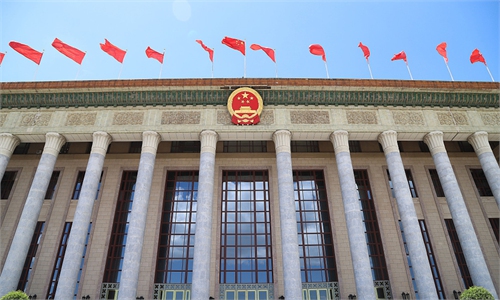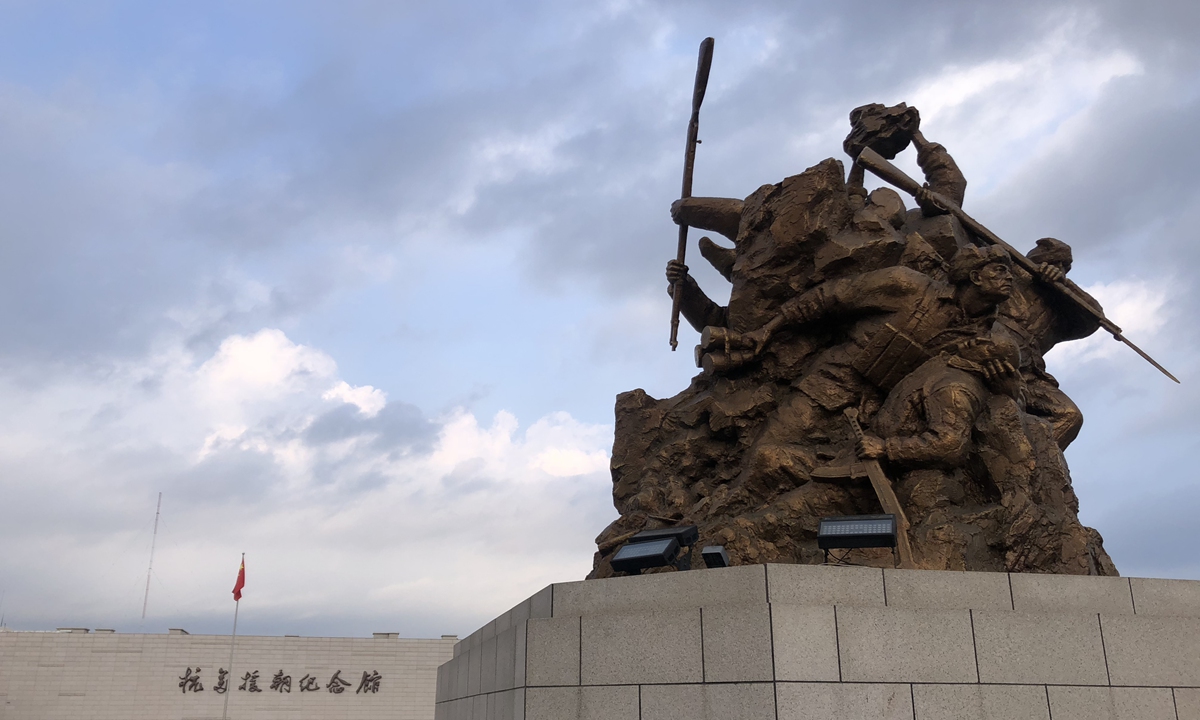
The Memorial Hall of the War to Resist US Aggression and Aid Korea in Dandong, Northeast China's Liaoning Province Photo: Li Qiao/GT
It's hard to imagine visitors bursting into song when they visit a memorial hall. But it occurs often in the Memorial Hall of the War to Resist US Aggression and Aid Korea in Dandong, Northeast China's Liaoning Province. The border city attracts many seeking to learn the history and commemorate the spirit of the Chinese People's Volunteers (CPV) army.
Visitors hum the nationally renowned anthem of the CPV army. "This song and the heroic deeds of CPV soldiers were with us growing up," a visitor in her seventies, with a Chinese national flag sticker on her face, told the Global Times.
October 25 was the CPV army's first fighting day of the war, exactly 70 years ago in 1950. Seventy years have passed and more CPV soldiers have left us in recent years. It may be difficult for the next generation to hear their stories in person. However, the CPV army's sacrifice of resisting US aggression, aiding Korea and defending national security is not forgotten, and their heroism is inspiring generations of Chinese committed to serving their country.
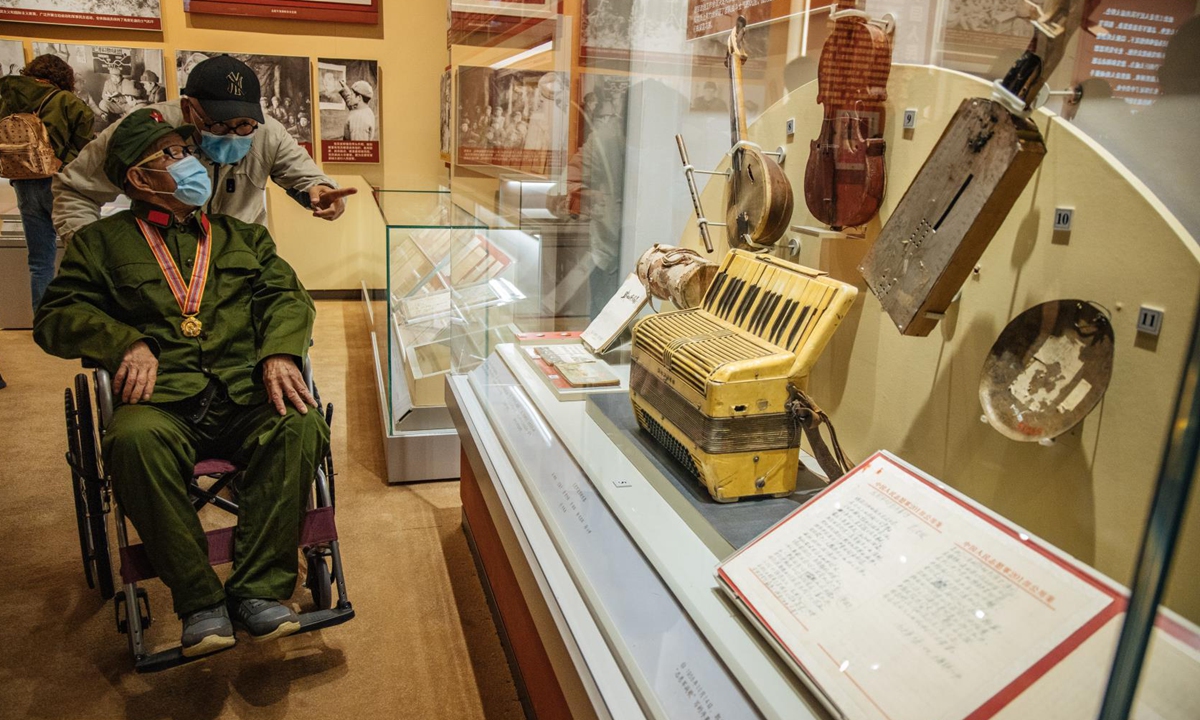
CPV soldier Han Tingfu, 94, is wheeled on a visit to the exhibition of the War to Resist US Aggression and Aid Korea in the Military Museum of the Chinese People's Revolution in Beijing on Sunday. Photo: Li Hao/GT
Heroes not forgotten
More than 29 million CPV soldiers participated in the War to Resist US Aggression and Aid Korea, with 197,653 soldiers confirmed as martyrs by China's Civil Affairs Ministry. Many of the surviving soldiers are in their nineties. For some veterans, it might be difficult to visit the memorial hall or other historical sites of the war in Dandong. But people related to CPV soldiers and who experienced that period of history still commemorate their legacy in various ways.
"Inspired by the CPV soldiers I admire most, I became a radar operator in Air Force when I grew up," He Shufang, an 84-year-old visitor from Fencheng city, Northeast China's Liaoning Province, told the Global Times.
While looking at a CPV exhibit in the memorial hall, He sang "Heroic Auto Driver," a song about the War to Resist US Aggression and Aid Korea. "It was a CPV soldier who taught me this song when we lived together. My biggest regret was seeing them go to the battlefield but not seeing them come back," He said.
Fengcheng is only 73 kilometers away from Dandong. Seventy years ago, his family lent a room to CPV soldiers. Half of his school building was lent to CPV soldiers.
"Even though we were far behind the US in terms of weaponry, I felt that our CPV soldiers were still full of courage to rush to the battlefield to defeat US aggressors under difficult conditions. The days living with them inspired me to join the army and defend our country later," He said.
He said he would enlist in the army again if he could and expects young people to work hard and love their country. "We Chinese love peace and don't want to get involved in wars but we are not afraid of wars if there are aggressions," He noted.
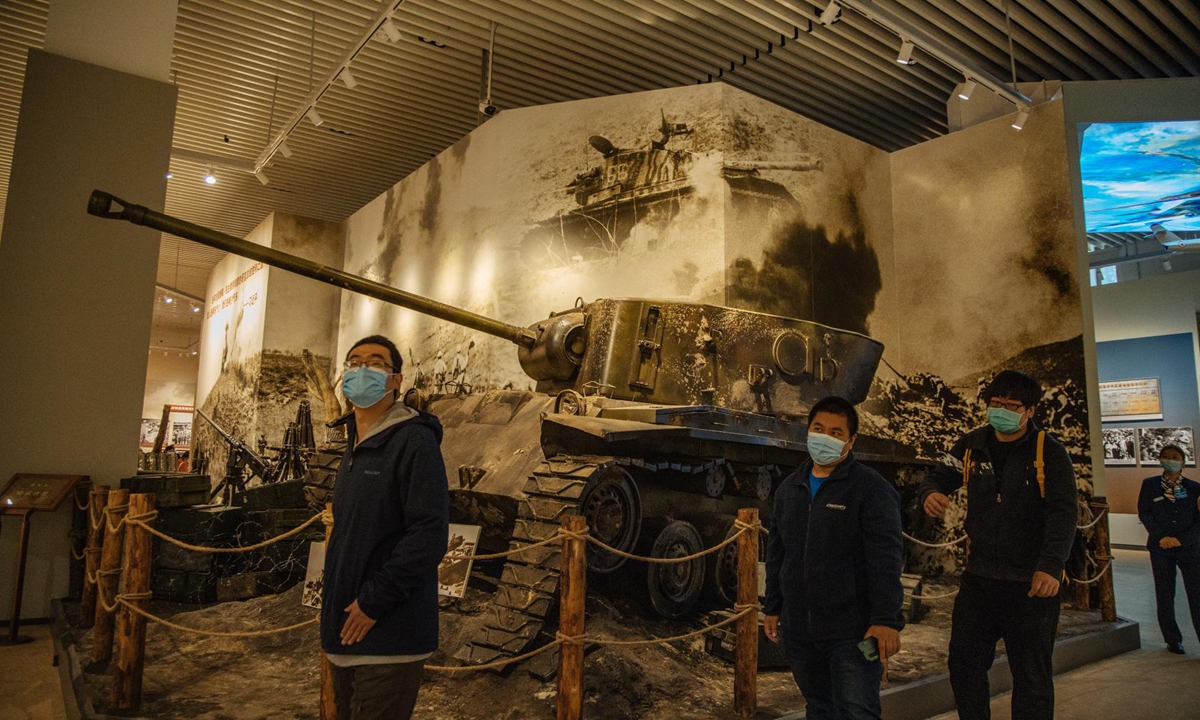
Visitors tour the Military Museum of the Chinese People's Revolution in Beijing on the first day of a special exhibition marking the 70th anniversary of the CPV army's participation in the War to Resist US Aggression and Aid Korea on Sunday. Photo: Li Hao/GT
There are also many relatives of CPV soldiers who visited the memorial hall in memory of their loved ones.
"I came to visit the memorial hall for the sake of my brother who passed away two years ago," said Xiao Yumei, a 75-year-old woman from Dalian, a four-hour's drive away from Dandong.
Her older brother, Xiao Peiyuan, was a CPV soldier who was transferred back home after losing a toe on his left foot during the war. The soldiers who fought with him all died in combat.
"Looking at the mock scene of the war, it's as if my brother is one of the unnamed heroes here on display. If only my brother could come see it and celebrate the 70th anniversary with us." Xiao said.
Xiao noted the living should appreciate heroes who sacrificed their lives for the safety of a neighboring country and the motherland, and that the living should follow in their footsteps of history.
Zhang Fasong, 90, traveled 1,223 kilometers from Hegang, Northeast China's Heilongjiang Province to observe the war's 70th anniversary in Dandong. He described this trip as his dream journey.
Seventy years ago, Zhang failed to join the CPV army because he was two centimeters short of the height requirement.
Standing on the Yalu River Broken Bridge watching North Korea on the other side, Zhang told the Global Times that, "I'm 90 and I don't know how long I'll live. Before I die, I just want to see the Yalu River and tell the CPV soldiers who crossed the river 70 years ago that China is today prosperous and we are enjoying a peaceful and happy life now."
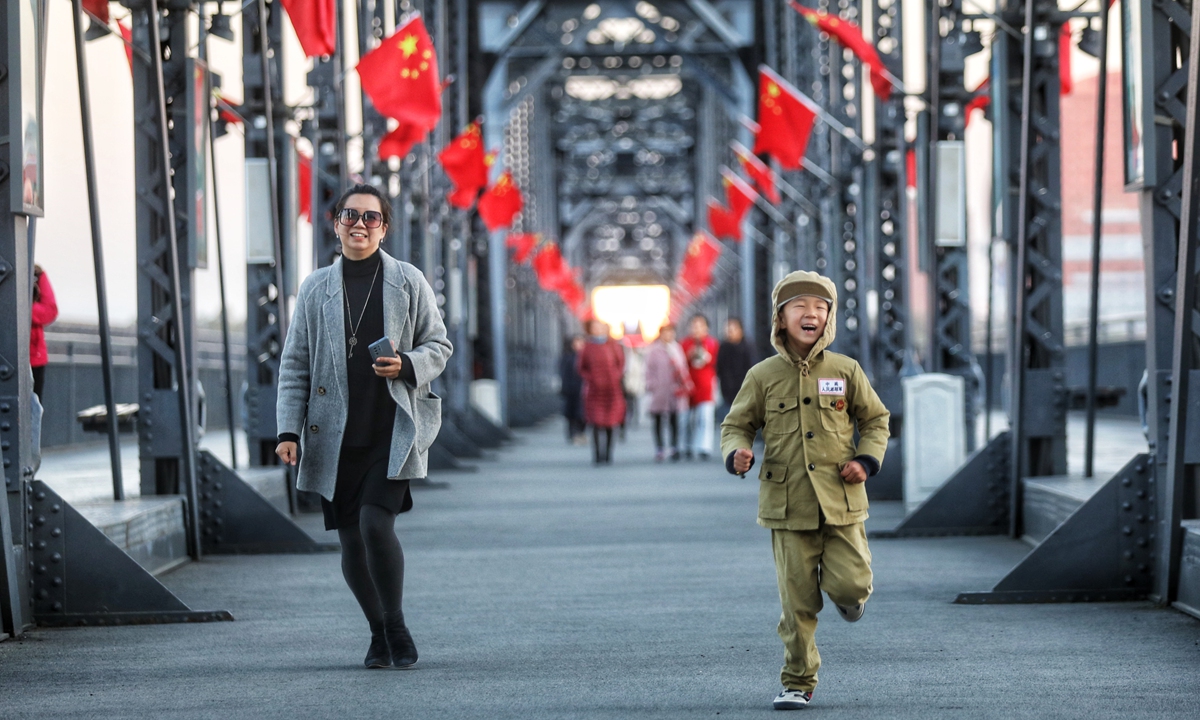
Six-year-old Huhu, dressed in CPV army clothing, commemorates the War to Resist US Aggression and Aid Korea, which his great-grandfather had participated in, on the Yalu River Broken Bridge in Dandong on Friday. Photo: Cui Meng/GT
Inheriting the spirit
Many young Chinese only learn about the history from textbooks and have little personal connection with the war. Some of them specifically come to Dandong to learn about this history, saying they are touched and inspired by the spirit of the CPV after learning of their heroism.
Zhang Yating, 32, expects to completely learn about the war history in Dandong. She is a nurse from Beijing who battled on the anti-epidemic front line earlier this year. She was honored as one of "the most admirable people in the new era."
Zhang was responsible for conducting nucleic acid tests.
"It was a very difficult time being wrapped in protective clothing every day and not being able to see my children and parents for safety reasons. However, compared with dangers which CPV soldiers suffered from, the difficulties which I experienced for anti-epidemic work were nothing," Zhang said after visiting the memorial hall.
Zhang said she was disappointed by US smears toward China's anti-epidemic work. "Our CPV heroes defeated US aggression 70 years ago. Our medical staff, inheriting their heroic spirit, struck down US slander by effectively controlling COVID-19," Zhang noted.
During Qingming Festival, Mid-autumn Festival and other national holidays, people from all over the country come to sweep tombs for CPV martyrs, Sun Dali, the director of the Dandong Cemetery of the War to Resist US Aggression and Aid Korea Martyrs, told the Global Times.
Because of anti-epidemic measures, the cemetery held an online memorial service for the Qingming Festival in April. A CPV martyr's relative in the epidemic's most affected city, Wuhan, Central China's Hubei Province, was quarantined at home and burst into tears seeing the tombstone online, Sun said.
China introduced the Heroes and Martyrs Protection Law in 2018, which protects the reputation of heroes and promotes commemoration of their legacy.
"The nation and society have paid more and more attention to the CPV martyrs in recent years. The young generation will inherit the spirit of our heroes," Sun said.

